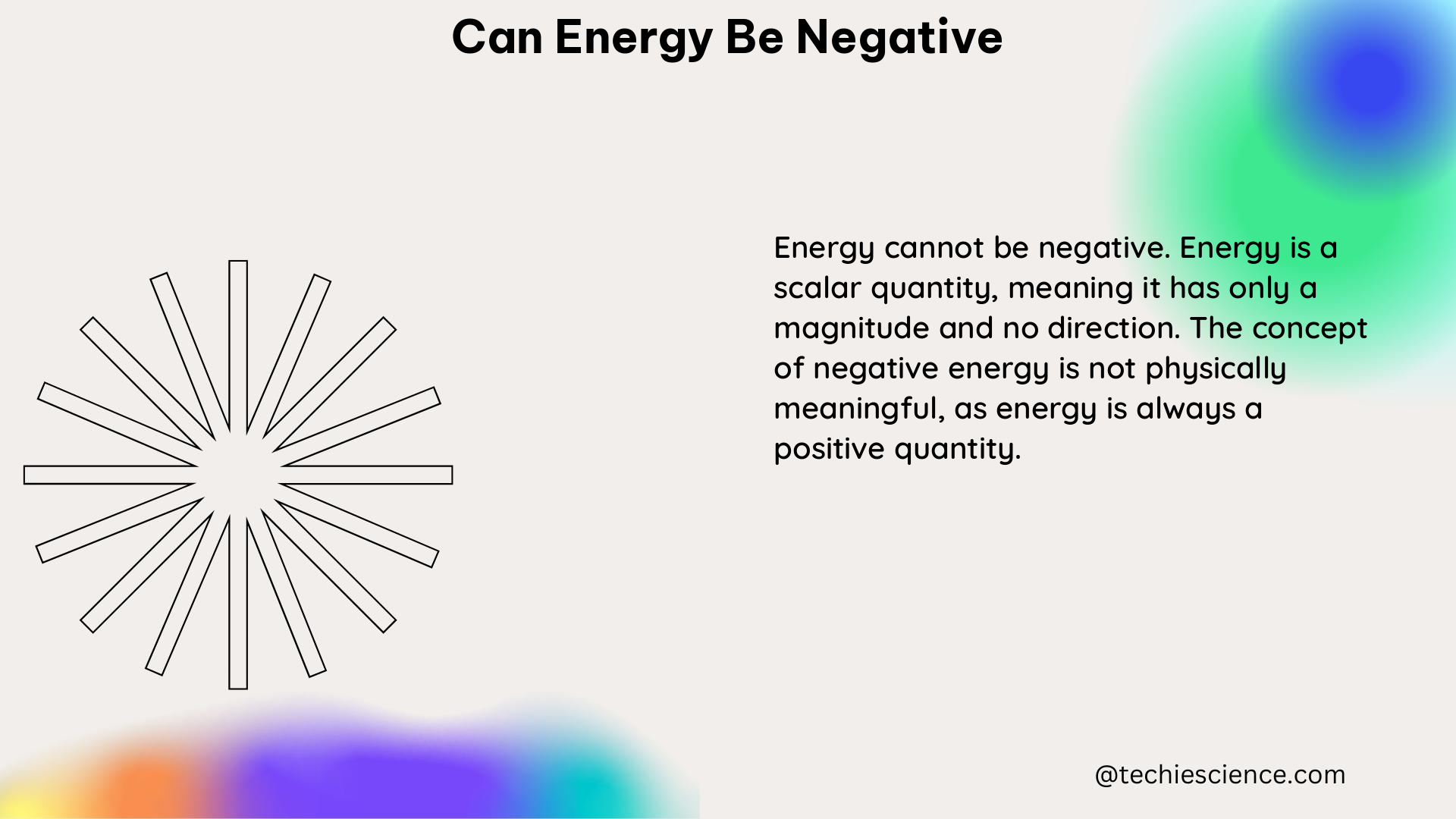In the realm of physics, the concept of energy is fundamental, and it can take on both positive and negative values. This article delves into the intricacies of negative energy, exploring its various manifestations, the underlying principles, and the practical implications of this seemingly counterintuitive phenomenon.
Understanding Negative Energy
Energy, as a scalar quantity, can be either positive or negative, and it is the difference in energy between two states or objects that determines their behavior, not the absolute value of the energy. Negative energy is often associated with potential energy, which represents the energy stored within a system or an object due to its position or configuration.
Potential Energy and Negative Energy
Potential energy can be negative when the energy of a system or object is less than its actual energy. This can occur in various scenarios, such as:
-
Gravitational Potential Energy: When an object is positioned above the Earth’s surface, its gravitational potential energy is positive. However, as the object moves closer to the Earth’s surface, its gravitational potential energy decreases, and it can become negative.
-
Electrostatic Potential Energy: In the context of electromagnetism, electrons can experience negative potential energy due to their negative charge. This negative potential energy affects the behavior of electrons in an electric field.
-
Nuclear Potential Energy: In nuclear physics, the potential energy of a nucleus can be negative, reflecting the strong nuclear force that binds the protons and neutrons together.
Energy Conservation and Negative Energy
The concept of negative energy may seem to contradict the principle of energy conservation, which states that the total energy in a closed system remains constant. However, this principle applies to the difference in energy between two states or objects, not to the absolute value of the energy.
Energy can be transferred or transformed, but the total amount of energy in a closed system remains constant. Negative energy is simply a representation of a lower potential energy state, and it can be balanced out by positive energy through various processes, such as energy transfer or conversion.
Practical Implications of Negative Energy

Negative energy has both positive and negative effects, depending on the context in which it is observed.
Positive Implications of Negative Energy
-
Expansion of the Universe: In cosmology, the concept of negative energy is crucial for understanding the expansion of the universe. The negative energy associated with dark energy is believed to be driving the accelerated expansion of the universe.
-
Quantum Mechanics: In quantum mechanics, the concept of negative energy is essential for describing certain phenomena, such as the creation and annihilation of virtual particles.
-
Motivation for Change: In the realm of emotions and psychology, negative energy can serve as a motivator for change and growth. Individuals can use negative energy as a catalyst to overcome challenges and improve their well-being.
Negative Implications of Negative Energy
-
Psychological Distress: Negative energy can be associated with negative emotions, such as stress, anxiety, and depression. Prolonged exposure to negative energy can have detrimental effects on an individual’s mental and physical health.
-
Unfavorable Conditions: Negative energy can also be associated with unfavorable conditions, such as financial instability, unhealthy relationships, or undesirable circumstances. These negative energy states can have a significant impact on an individual’s quality of life.
Overcoming Negative Energy
Depending on the context, there are various strategies and techniques to deal with or overcome negative energy.
Strategies for Dealing with Negative Energy in Physics
-
Energy Transfer and Conversion: In physics, negative energy can be balanced out by positive energy through various processes, such as energy transfer or conversion. This can involve the transformation of one form of energy into another, or the redistribution of energy within a system.
-
Quantum Field Theory: In the realm of quantum mechanics, the concept of negative energy is addressed through the principles of quantum field theory, which provides a framework for understanding the creation and annihilation of virtual particles.
Strategies for Dealing with Negative Energy in Emotions and Psychology
-
Positive Thinking: Cultivating a positive mindset and focusing on constructive thoughts can help individuals manage and reduce negative energy.
-
Mindfulness and Meditation: Practices such as mindfulness and meditation can help individuals become more aware of their thoughts and emotions, allowing them to better regulate and cope with negative energy.
-
Self-Care: Engaging in self-care activities, such as exercise, healthy eating, and relaxation techniques, can help individuals maintain a balanced emotional state and mitigate the effects of negative energy.
Conclusion
In the world of physics, energy can indeed be negative, and this concept is essential for understanding various phenomena, from the expansion of the universe to the behavior of electrons in electric fields. While the idea of negative energy may seem counterintuitive, it is consistent with the principle of energy conservation and can have both positive and negative implications, depending on the context.
By understanding the nature of negative energy and the strategies for dealing with it, individuals can better navigate the complexities of the physical and emotional realms, harnessing the power of negative energy to drive positive change and growth.
References:
– What is Negative Energy and How Does it Relate to the Capacity for Work?
– If energy is a scalar quantity, how can it be negative?
– Energy
Hi, I’m Akshita Mapari. I have done M.Sc. in Physics. I have worked on projects like Numerical modeling of winds and waves during cyclone, Physics of toys and mechanized thrill machines in amusement park based on Classical Mechanics. I have pursued a course on Arduino and have accomplished some mini projects on Arduino UNO. I always like to explore new zones in the field of science. I personally believe that learning is more enthusiastic when learnt with creativity. Apart from this, I like to read, travel, strumming on guitar, identifying rocks and strata, photography and playing chess.